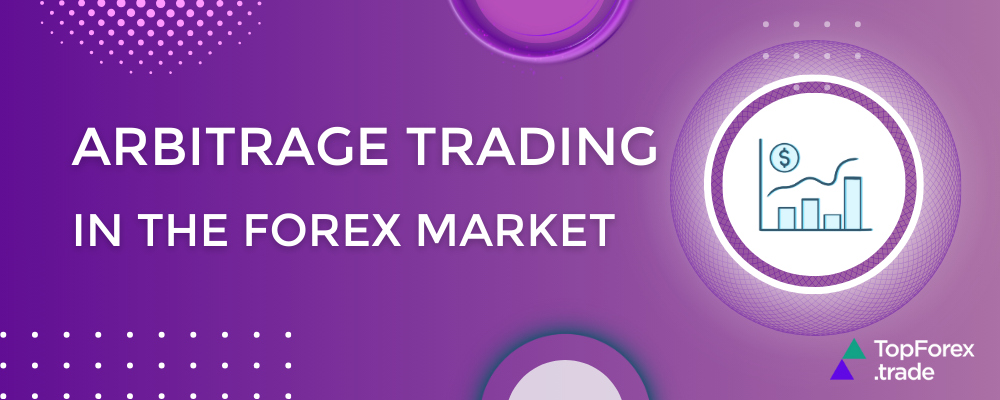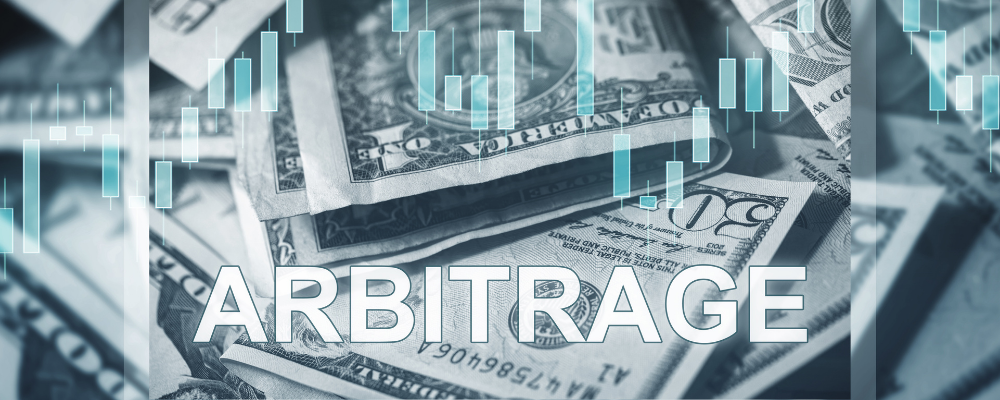Forex arbitrage trading: definitions, types, examples, and Top FX brokers

Arbitrage, often referred to as the “free lunch” of financial markets, offers investors the tantalizing prospect of generating profits without assuming any risk. But behind this seemingly magical strategy lies a complex interplay of market dynamics, technological prowess, and strategic acumen.
In this article, we embark on a journey to unravel the intricacies of arbitrage trading — a strategy that has intrigued and captivated investors for generations. From its fundamental principles to the advanced techniques employed by today’s arbitrageurs, we delve deep into exploiting market inefficiencies for financial gain.
What is FX arbitrage trading?

Arbitrage trading is a financial strategy that capitalizes on the price differentials of identical or similar assets across different markets or exchanges. The essence of arbitrage lies in exploiting temporary discrepancies in asset prices to generate risk-free profits through simultaneous buying and selling. This practice relies on the principle that in efficient markets, prices of identical assets should converge over time, eliminating any price differentials.
Arbitrage opportunities can arise due to various factors, including differences in supply and demand dynamics, currency exchange rates, transaction costs, or delays in information dissemination. By swiftly identifying and acting upon these price disparities, arbitrageurs aim to profit from the imbalance before market forces correct it.
The process of arbitrage trading typically involves three key steps:
- Identifying opportunities: Arbitrageurs continuously monitor multiple markets or exchanges for discrepancies in asset prices. This could involve comparing prices of the same asset across different geographical locations, different trading platforms, or different periods.
- Executing trades: Once an arbitrage opportunity is identified, traders act swiftly to exploit it. They simultaneously buy the asset at a lower price in one market and sell it at a higher price in another market, taking advantage of the price differential.
- Capturing profits: By buying low and selling high simultaneously, arbitrageurs secure a risk-free profit. The magnitude of the profit depends on the size of the price differential and the volume of assets traded.
Arbitrage trading is crucial in promoting market efficiency by quickly aligning prices across different markets and reducing discrepancies. However, successful arbitrage requires sophisticated technology, advanced analytical tools, and fast execution capabilities. Moreover, arbitrage opportunities are fleeting, and as more traders enter the market, these opportunities become scarcer and harder to exploit.
Despite its complexities and challenges, arbitrage trading remains a cornerstone of modern financial markets, offering the potential for profit while contributing to the overall efficiency and stability of global financial systems.
Types of arbitrage trading

Arbitrage trading can be categorized into several types based on the nature of the market discrepancy being exploited. Here are some common types of arbitrage:
- Spatial arbitrage: This type of arbitrage involves exploiting price differences for the same asset in different geographic locations. For example, gold may be priced differently in New York and London due to factors such as supply-demand dynamics, currency exchange rates, or transportation costs.
- Temporal arbitrage: Temporal arbitrage exploits price differences of an asset over time. This could involve taking advantage of pricing anomalies between the spot market and futures market or capitalizing on delays in information dissemination. For instance, a stock might be priced differently before and after the release of an earnings report.
- Statistical arbitrage: Statistical arbitrage, also known as pairs trading, involves identifying mispriced relationships between related securities. Traders exploit temporary deviations from their historical price relationships, such as the price ratio between two stocks or the spread between correlated assets, expecting them to revert to their mean over time.
- Triangular arbitrage: Triangular arbitrage exploits discrepancies in currency exchange rates across different currency pairs. It involves trading three currencies simultaneously to profit from inconsistencies in the exchange rates. For example, if the exchange rates for EUR/USD, GBP/USD, and EUR/GBP do not align properly, traders can exploit the discrepancy by executing a series of transactions to lock in profits.
- Convergence arbitrage: Convergence arbitrage exploits price discrepancies between related assets that are expected to converge in value over time. This could involve buying undervalued securities and selling overvalued ones within the same market or asset class, anticipating their prices to align eventually.
- Merger arbitrage: Merger arbitrage involves exploiting price discrepancies between the stock prices of acquiring and target companies during a merger or acquisition deal. Traders buy shares of the target company at a discount and short-sell shares of the acquiring company to profit from the price convergence when the merger is completed.
These are just a few examples of arbitrage types, and there can be variations and combinations depending on the specific market conditions and assets being traded. Regardless of the type, arbitrage trading aims to capitalize on market inefficiencies to generate profits with minimal risk.
Example of arbitrage trading

Suppose there are three currency pairs: EUR/USD, GBP/USD, and EUR/GBP, traded on the same Forex platform. Due to temporary market inefficiencies or disparities in liquidity, the exchange rates for these currency pairs are not perfectly aligned.
- EUR/USD exchange rate: 1.2000
- GBP/USD exchange rate: 1.3500
- EUR/GBP exchange rate: 0.8900
Using these exchange rates, an arbitrageur notices a potential triangular arbitrage opportunity:
1. Identifying the opportunity: The arbitrageur observes that the cross rate implied by the direct quotes for EUR/USD and GBP/USD (EUR/GBP = EUR/USD ÷ GBP/USD) is different from the actual quoted rate for EUR/GBP.
- Implied EUR/GBP rate = 1.2000 ÷ 1.3500 ≈ 0.8889
- Quoted EUR/GBP rate = 0.8900
2. Execution: The arbitrageur exploits this discrepancy by executing a series of trades to capitalize on the mispricing:
a. Sell EUR for USD: The arbitrageur sells 1 million euros for $1,200,000 (1,000,000 euros × 1.2000 EUR/USD).
b. Buy GBP with USD: The arbitrageur then converts the $1,200,000 into British pounds at the GBP/USD rate, acquiring £888,888.89 (1,200,000 USD ÷ 1.3500 GBP/USD).
c. Sell GBP for EUR: Finally, the arbitrageur converts the pounds back into euros at the EUR/GBP rate, resulting in approximately 1,000,000 euros (£888,888.89 × 0.8900 EUR/GBP).
3. Profit: The arbitrageur ends up with approximately the same amount of euros they started with but with a profit due to the discrepancy in exchange rates.
4. Market correction: As more arbitrageurs exploit the triangular arbitrage opportunity, the increased trading activity in the affected currency pairs may cause their exchange rates to adjust, ultimately eliminating the arbitrage opportunity.
Triangular arbitrage relies on exploiting inconsistencies between cross rates implied by direct exchange rates and actual quoted rates. However, it’s crucial to act swiftly, as such opportunities tend to disappear rapidly in highly liquid markets like Forex.
Arbitrage trading costs

Arbitrage trading, while offering profit potential, is not without costs. These costs can impact the overall profitability of arbitrage strategies and must be carefully considered by traders. Here are some common costs associated with arbitrage trading:
- Transaction costs: Fees incurred for executing trades.
- Spread costs: The price difference between buying and selling.
- Slippage: Difference between expected and actual execution prices.
- Capital costs: Investment required for trading.
- Technology costs: Expenses for advanced trading tools.
- Regulatory costs: Compliance with laws and regulations.
- Risk management costs: Strategies to mitigate potential losses.
Effective management of these costs is essential for effective arbitrage trading.
Top FX brokers for arbitrage trading
Arbitrage trading, leveraging price differences for profit, is a cornerstone of Forex trading. To facilitate this strategy, choosing the right brokerage is paramount. Our list presents the top FX brokers tailored for arbitrage trading. These platforms boast advanced technology, competitive pricing, and reliable execution. With our curated selection, traders can confidently engage in arbitrage trading, backed by trusted brokerage partners.
BlackBull arbitrage trading
BlackBull establishes itself as a dependable option for traders exploring the dynamic realm of financial markets. Boasting a diverse range of trading instruments spanning commodities, currency pairs, equities, futures, indices, and cryptocurrencies, BlackBull sets itself apart by granting access to genuine shares for trading. Regulated by the Financial Services Authority in Seychelles, the broker prioritizes the security and confidence of its traders.
Recognizing the diverse preferences of traders, BlackBull accommodates a wide spectrum of needs through its varied account types, including Standard, Prime, Institutional, and Islamic (Swap-Free) accounts. Alongside providing real-market trading opportunities, the broker fosters skill development within a risk-free environment by offering a demo account.
BlackBull distinguishes itself by delivering a flexible trading experience across multiple platforms, including MT4, MT5, cTrader, Web Trader, and TradingView. This commitment to adaptability and accessibility extends to specialized platforms like BlackBull CopyTrader and BlackBull Shares, complemented by mobile and tablet applications. Notably, BlackBull’s offerings position it as a preferred choice for traders interested in indices trading, further underscoring its dedication to meeting the diverse needs of its clientele.
XTB arbitrage trading
XTB has earned praise for its extensive Forex and CFD trading services, positioning itself as one of the largest FX & CFD brokers traded on stock exchanges worldwide. With a reach spanning over 190 countries, XTB caters to a global clientele.
Emphasizing financial security and transparency, XTB adheres to rigorous regulation by esteemed financial authorities, including the FCA (Financial Conduct Authority) in the UK, CySEC (Cyprus Securities and Exchange Commission), and KNF (Polish Financial Supervision Authority). This dedication to regulatory oversight ensures a reliable trading environment, fostering confidence among traders and investors.
XTB’s broad offering encompasses over 1500 CFDs across diverse asset classes, including forex currency pairs, indices, commodities, shares, and cryptocurrencies. This extensive selection empowers traders to diversify their portfolios and explore various markets, accommodating a range of investment preferences.
Traders benefit from intuitive trading platforms, notably the proprietary xStation and the widely-used MetaTrader 4 (MT4). Equipped with advanced charting tools, technical indicators, and real-time market data, these platforms facilitate informed decision-making. XTB offers various account types, including the Standard account and swap-free options, each tailored to specific features and fee structures to accommodate different trading styles.
In addition to its robust trading infrastructure, XTB provides an array of research and analysis tools, such as daily market analysis, economic calendars, and webinars. These resources empower traders with valuable insights, enabling them to stay informed about market trends and significant news events.
AvaTrade arbitrage trading
AvaTrade, a globally recognized brokerage firm, has established itself as a trailblazer in offering online trading services across an extensive range of financial instruments. From currency pairs and commodities to indices, stocks, CFDs, and cryptocurrencies, AvaTrade provides traders worldwide with a comprehensive array of options.
Committed to delivering a seamless trading experience, AvaTrade offers a diverse suite of trading platforms and software tailored to suit various preferences. These platforms include MetaTrader 4/5, WebTrader, AvaOptions, AvaSocial (CopyTrading platform), AvaTradeGo, and Auto Trading platforms like ZuluTrade and DupliTrade.
AvaTrade distinguishes itself by providing traders with tight fixed spreads, commission-free trading, and flexibility in minimum trading account size. Traders can familiarize themselves with the platform using a complimentary $100,000 demo account.
Emphasizing regulatory compliance, AvaTrade holds licenses from reputable institutions such as IIROC, BVIFSC, FSCA, ASIC, ADGM, FSA, and FFAJ, ensuring the safety and security of client funds.
As a dynamic entity, AvaTrade continually evolves to meet the diverse needs of its clientele. This includes catering to both experienced traders and newcomers through innovative features aimed at enhancing the trading experience. Notable offerings include the AvaProtect risk management tool, Trading Central Analytics, the Guardian Angel feedback system, Expert Advisors, and a range of automated and Social trading possibilities.
XM Group arbitrage trading
XM Group is renowned as a highly respected global Forex broker, renowned for its dedication to accessibility and client-focused terms. Offering a minimum deposit of just $5 across all trading accounts, including Micro, Standard, and Zero, XM Group appeals to traders of all skill levels. Furthermore, XM Group distinguishes itself with unique features such as negative balance protection, favorable leverage, and tight spreads, enriching the overall trading experience.
With access to an extensive range of over 1000 trading instruments, including indices CFDs, XM Group ensures traders have ample opportunities to diversify their portfolios. These instruments are easily accessible through the reliable and versatile MT4/MT5 platforms. Additionally, to enhance user convenience, XM Group provides a mobile app, enabling seamless access to international markets. The app features a unified login for both demo and live accounts, empowering MT5 platform users to efficiently manage their accounts and execute trades across XM’s diverse range of instruments.
With a stellar reputation and the trust of millions of users globally, XM Group solidifies its reliability by acquiring licenses from reputable regulators, including ASIC, CySEC, IFSC, and DFSA. This underscores the broker’s unwavering commitment to regulatory standards and ensures a secure trading environment for its clients.
Plus500 arbitrage trading
Since its establishment in 2008, Plus500 has emerged as a prominent online broker, specializing in providing CFD trading services across a diverse range of assets. These assets encompass shares, currency pairs, precious metals, commodities, oil and gas, and indices.
The platform offers two distinct types of accounts: real and demo. The demo account comes with unlimited usage, enabling traders to hone their skills by practicing new strategies, and exploring unfamiliar tools.
Plus500 streamlines the trading process by eliminating the need for software downloads. Instead, it utilizes Web Trader, compatible with both Windows and macOS, along with mobile versions tailored for smartphones and tablets. Notably, the web version boasts a unique design and functionality, offering a comprehensive suite of analysis and forecasting tools. On the platform’s main screen, users can seamlessly select instruments and indicators, access news updates, and leverage the economic calendar.
With a global presence, Plus500 operates under the regulation of multiple authorities. These include the FCA (UK), CySEC (Cyprus), SFSA (Seychelles), AFSL issued by ASIC, FSP issued by FMA (New Zealand), MAS (Singapore), and holds an authorized financial services provider license issued by FSCA (South Africa).
79% of retail investor accounts lose money when trading CFDs with this provider. You should consider whether you can afford to take the high risk of losing your money.
Plus500EE AS is authorised and regulated by the Estonian Financial Supervision and Resolution Authority (Licence No. 4.1-1/18).
Related articles:
Forex arbitrage trading - FAQ